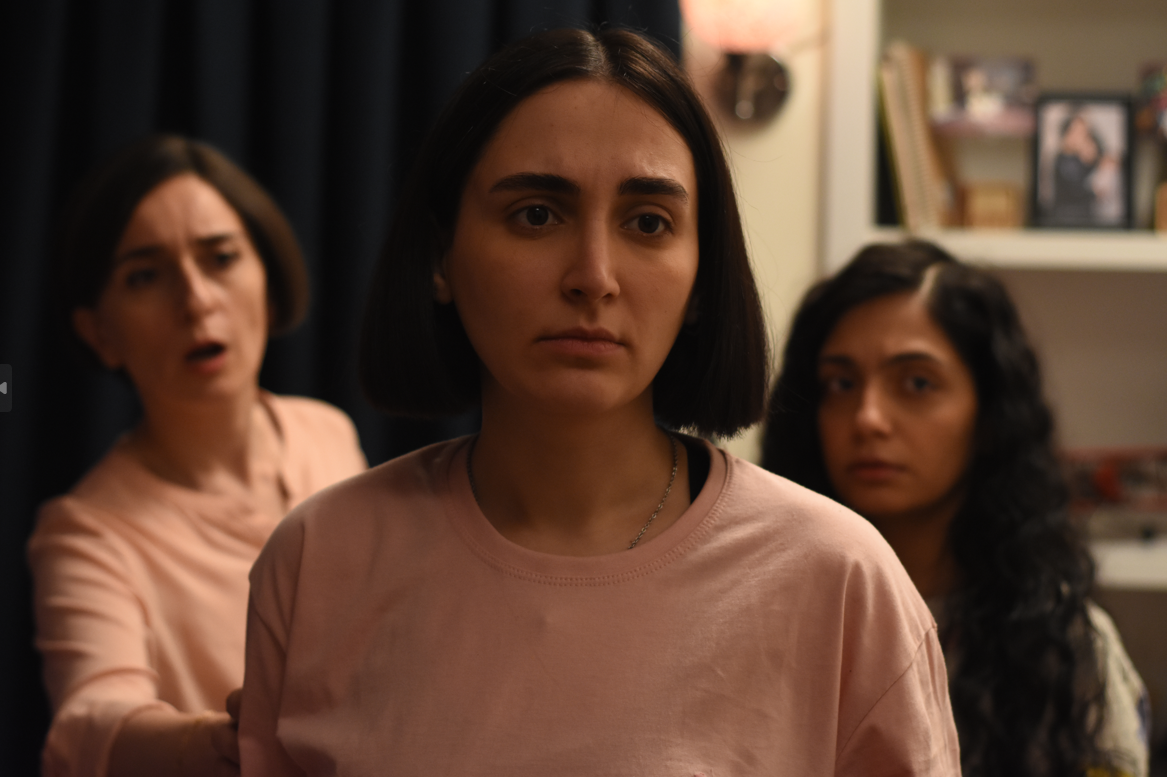
Neon photo

Audio By Carbonatix
It’s usually not a good sign when a director says his film is too long, even in jest. Last year, when the Iran-made The Seed of the Sacred Fig (D’ne-ye anjîr-e ma’âbed) screened at the New York Film Festival, director Mohammad Rasoulof introduced the three-hour film by joking that he wished he had made a shorter movie – the 8:30 p.m. start time and subsequent Q&A meant most people in the audience would get home well after midnight. I did not stay for the Q&A, because I found myself agreeing with Rasoulof about two hours in – it is too long, but that’s the least of its problems.
The Seed of the Sacred Fig begins as Iman (Missagh Zareh), a lawyer in Tehran, is seemingly moving up in the world. He will become a judge in the Revolutionary Court, a coveted position that will give him and his family a bigger apartment and more prestige. He cautions his wife Najmeh (Soheila Golestani) and teenage daughters Rezvan (Mahsa Rostami) and Sana (Setareh Maleki) that things will change: with their father’s influence comes a greater need for discretion and secrecy. They can’t tell people what he does. They can’t have friends over. The state even issues Iman a handgun for security.
Soon, he finds the job is not all it’s cracked up to be. His superiors expect him to rubber-stamp an extreme sentence without even investigating the case – to refuse would put him and his family at risk. This is bad enough, but then an even greater crisis unfolds: Countless Iranians take to the streets, women tearing off their hijabs, as antigovernment unrest sweeps the nation. These are the Mahsa Amini protests, the real-life uprisings that took place in 2023 after a young woman arrested for “improperly” wearing her hijab was killed in police custody. They popularized the slogan “Women, life, freedom” and led to a brutal government crackdown resulting in hundreds of deaths and thousands of arrests. Rasoulof and his editor, Andrew Bird, intersperse the action in the film with actual footage of the protests and police brutality captured on cell phones.
Phones are also at the heart of a growing rift in Iman’s family as the patriarch deals with increased stress and a billowing caseload of arrested protesters. The parents, who trust the government and believe what they see on state TV, become at odds with their daughters, who witness the regime’s violent response unfold on social media. A close friend, Sadaf (Niousha Akhshi) is caught in the middle and badly injured; Rezvan and Sana care for her in secret, lest their father find out they harbored a supposed rebel. The situation deteriorates even further when Iman misplaces his gun, a potentially deadly mistake. He recruits the family to turn over the apartment in search of the weapon. Then he begins to suspect it was taken – he brings his family to a state interrogator, and all trust between the four begins to crumble.

Mahsa Rostami (left) and Setareh Maleki (right) in director Mohamad Rasoulof’s The Seed of the Sacred Fig
Neon photo
The story of the film’s production and release is as much an outgrowth of Iran’s repressive political climate as the film itself. Several Iranian filmmakers have come into conflict with the censorious government, notably Jafar Panahi, who has continued his career in secret since he was banned from filmmaking in 2010. Rasoulof, who also shot Sacred Fig clandestinely, has faced similar struggles, facing prison time and travel bans for defying the government’s censorship. Making this film, however, has forced him into exile: In the wake of its selection for the Cannes Film Festival last year, where it eventually won the Special Jury Prize, he fled to Europe after the Iranian government sentenced him to eight years in prison and flogging. Actors Rostami, Maleki, and Akhshi have also left Iran. The film was submitted to the Oscars not by Iran, but by Rasoulof’s adopted country of Germany; it is currently nominated for Best International Feature Film.
Nevertheless, the film is flawed. I appreciated the chamber drama of its first half, with the generational conflict mirroring the same sorts of interfamily political divisions that have affected people in this country. The performers, especially the sisters, acquit themselves very well; Rezvan and Sana’s shock and sadness at both the government’s brutality and their parents’ obstinance are transmitted with pathos. If Rasoulof had stayed on this track, it might have resulted in a quieter but more compelling film. Instead, the action, driven by Iman’s increasing paranoia, leaves Tehran, and the film barrels full speed into a much wilder direction. Enemies are unmasked. Secrets are revealed. It’s an unbearably silly conclusion that feels absurd and completely divorced from the slow-ratcheting tension built over the last two hours.
Rasoulof seemingly wants to make the point that living under such a regime will drive people to insanity and mistrust of those they hold dearest. But his approach to that idea comes out of nowhere, betrays his characters, and completely baffles his audience. What could have been a more intelligent and nuanced statement about the maddening nature of authoritarianism, a theme handled with much more finesse by fellow Oscar nominee I’m Still Here, instead becomes a simple black-and-white plot of heroes and villains.
Let us make no mistakes, however: Rasoulof and his cast and crew are incredibly brave and must be commended for defying their repressive government to make such a bold statement. Few of us are willing to risk such grave consequences for the sake of artistry. It’s just a shame that so much was sacrificed for such an imperfect film.
New Times first viewed this film at the 62nd New York Film Festival.
The Seed of the Sacred Fig. Starring Soheila Golestani, Missagh Zareh, Mahsa Rostami, Setareh Maleki, and Niousha Akhshi. Written and directed by Mohammad Rasoulof. 168 minutes. Rated PG-13. Opens locally Friday, January 31.